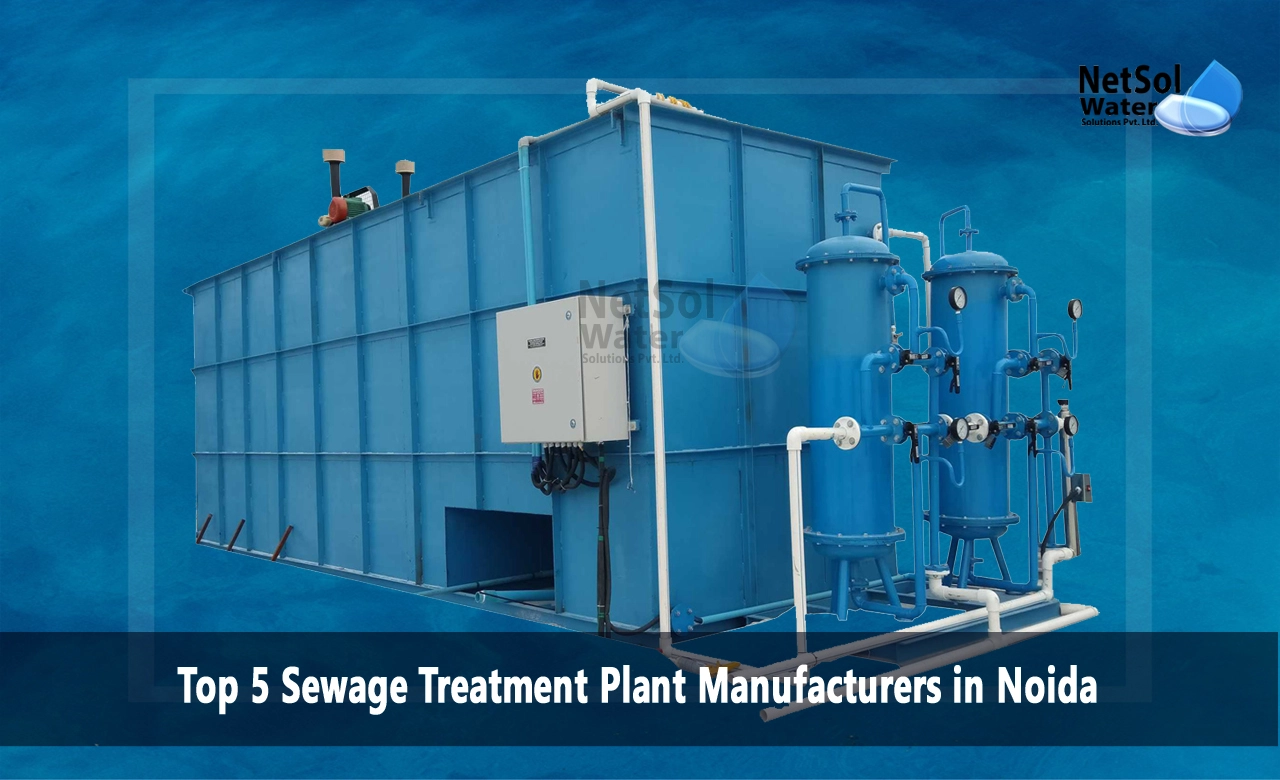Top 5 Sewage Treatment Plant Manufacturers in Noida:
1: Netsol Water:
Netsol Water is the dominant sewage treatment plant manufacturer in Noida, having experience of more than two decades, and has done many large-scale and mid-level projects in India and abroad. Netsol Water fulfills all the compliance and regulations to manufacture STP, ETP, commercial, and industrial RO plants. This all the reasons that make Netsol Water a global leader in the field of water and wastewater treatment.
2: Sewage Treatment Plants:
Sewage Treatment Plants is a well-established name in the field of water and wastewater treatment. They specialize in the manufacturing of sewage treatment plants and they offer a wide range of sewage treatment plants including both traditional and modern technologies. Their expertise in water treatment solutions makes them a reliable choice for sewage treatment plants in Noida.
3: Compact STP Plant:
Compact STP Plant is a Noida-based manufacturer known for its innovative and cost-effective sewage treatment solutions. They offer customized designs to suit the specific needs of their clients, ensuring high-quality treatment with minimal environmental impact.
4: Urban STP Plant:
With a global presence, Urban STP Plant is a renowned player in the field of environmental and energy solutions. They provide cutting-edge sewage treatment plants that focus on sustainability, energy efficiency, and compliance with environmental regulations.
5: Compact ETP Plant:
Compact ETP Plant is a prominent sewage treatment plant manufacturer known for its electrochlorination technology. They offer eco-friendly solutions that effectively treat sewage and industrial effluents while minimizing the use of chemicals.
What is Sewage Water?
Sewage water is also known as wastewater including solid and liquid components generated by various sources like human activities such as domestic, industrial, and commercial processes. It encompasses the discharge from toilets, sinks, showers, washing machines, industrial facilities, and other sources. Sewage is a complex mixture that may contain a variety of contaminants, both organic and inorganic.
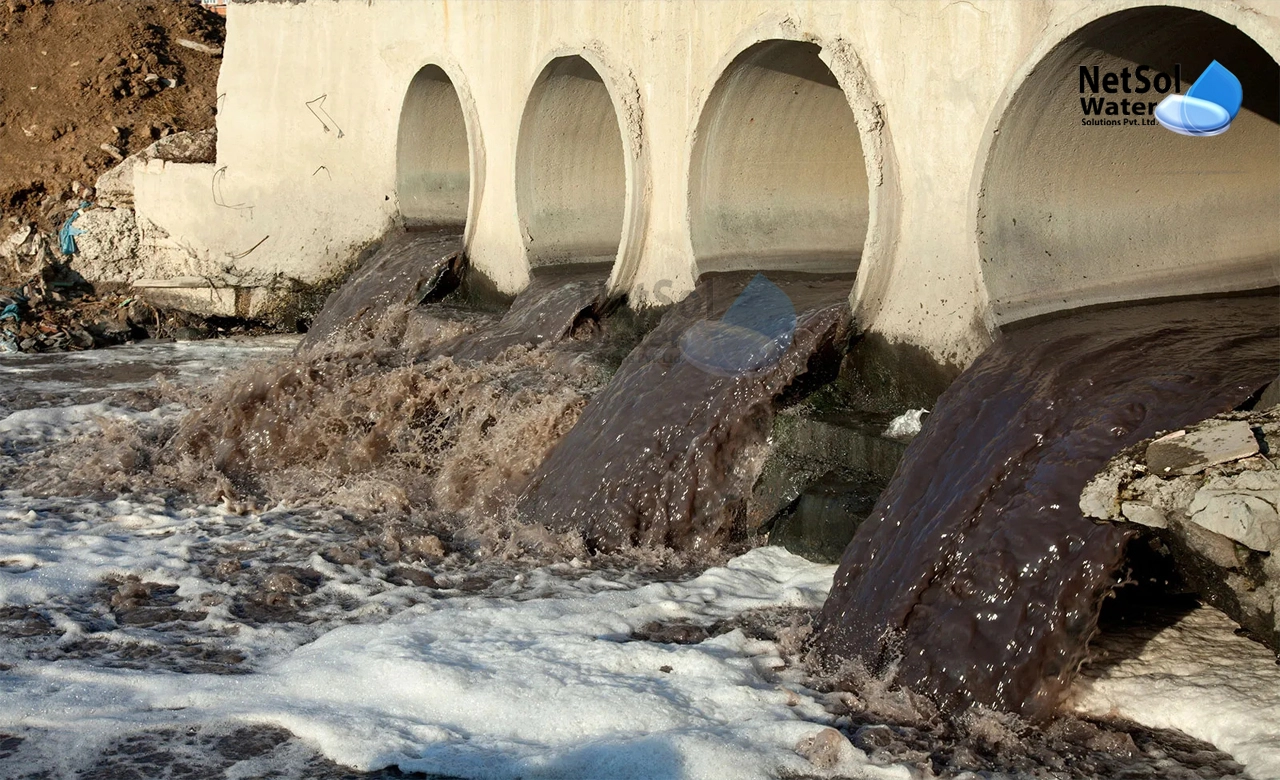
Types of Sewage Water:
Liquid Waste (Graywater and Blackwater):
Graywater: This is wastewater generated from domestic activities such as bathing, laundry, and dishwashing. It does not include water contaminated with fecal matter.
Blackwater: This is wastewater that contains fecal matter and is typically discharged from toilets. It is more heavily polluted than graywater.
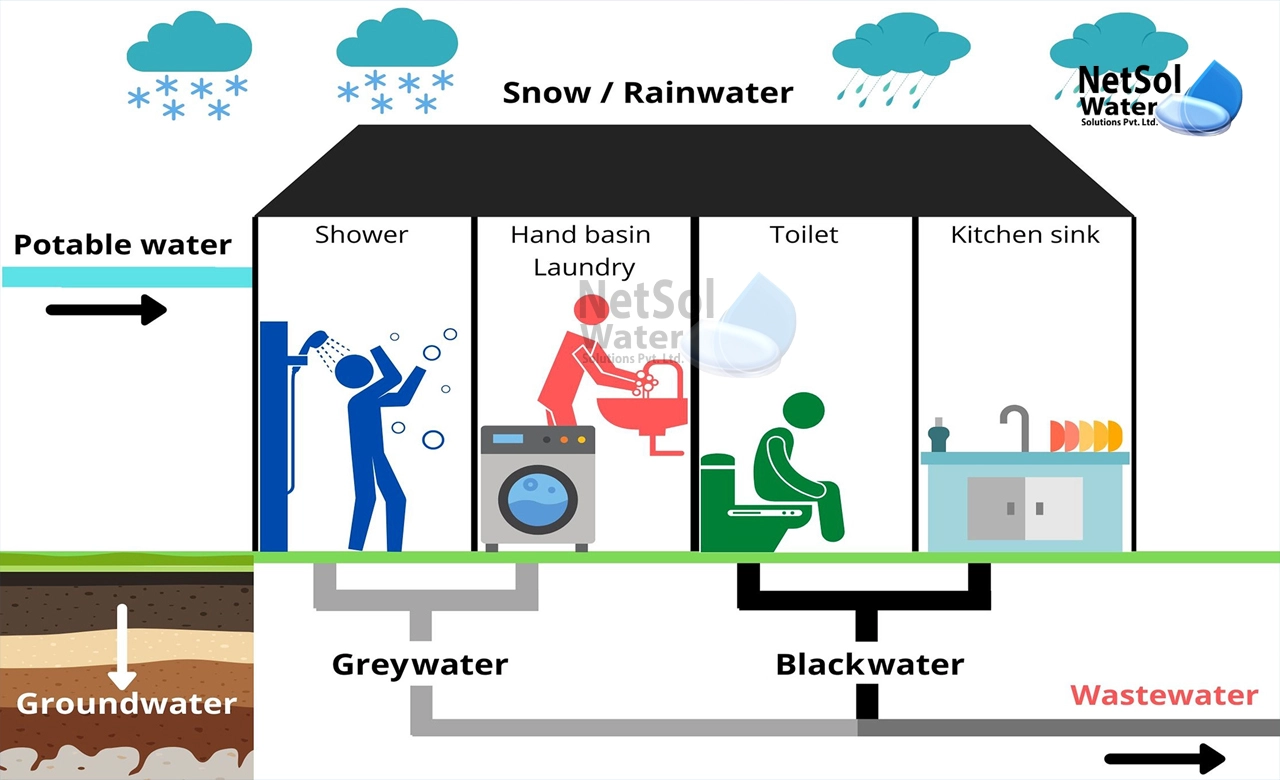
Solid Waste:
Suspended Solids: These are particles that remain in suspension in the wastewater and can include organic matter, sand, silt, and other debris.
Settleable Solids: Heavier particles that settle at the bottom of treatment tanks.
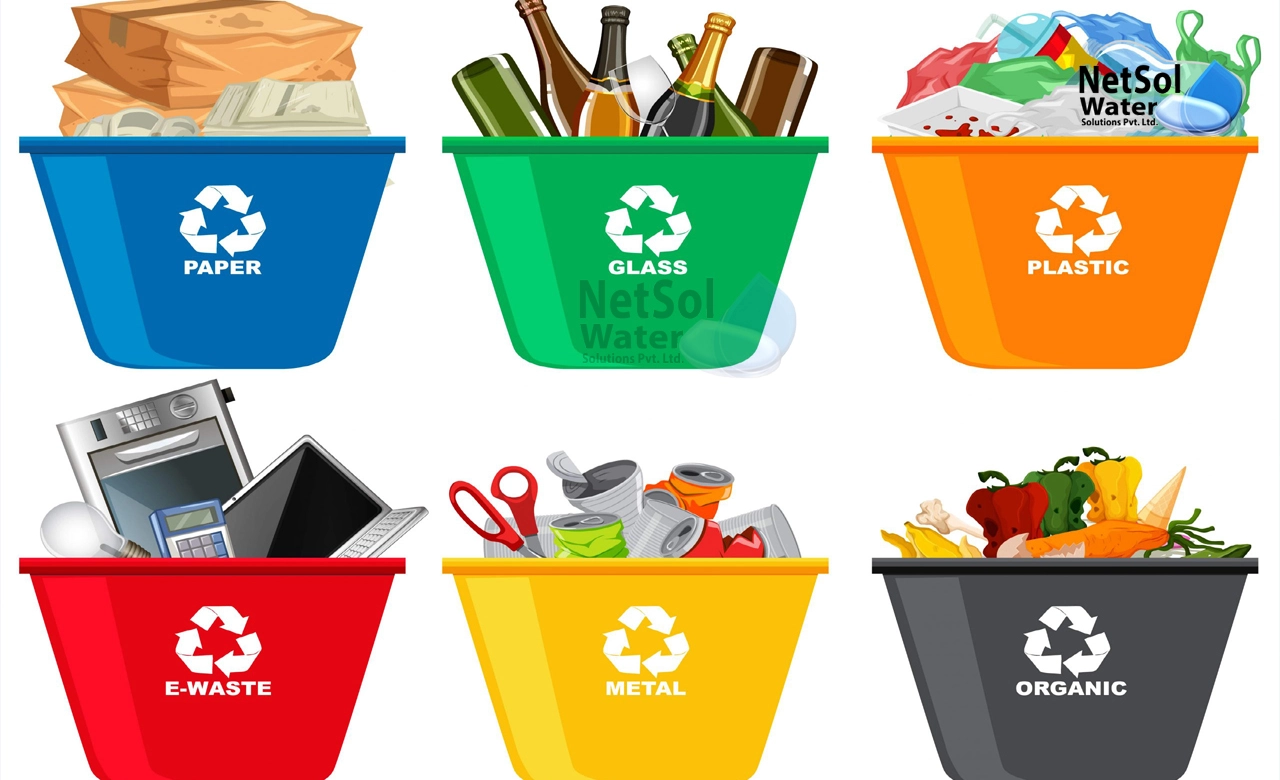
Organic and Inorganic Contaminants:
Organic Compounds: Including substances like oils, greases, detergents, and organic matter derived from human waste.
Inorganic Compounds: Such as nutrients (nitrogen and phosphorus), heavy metals, and various chemicals.
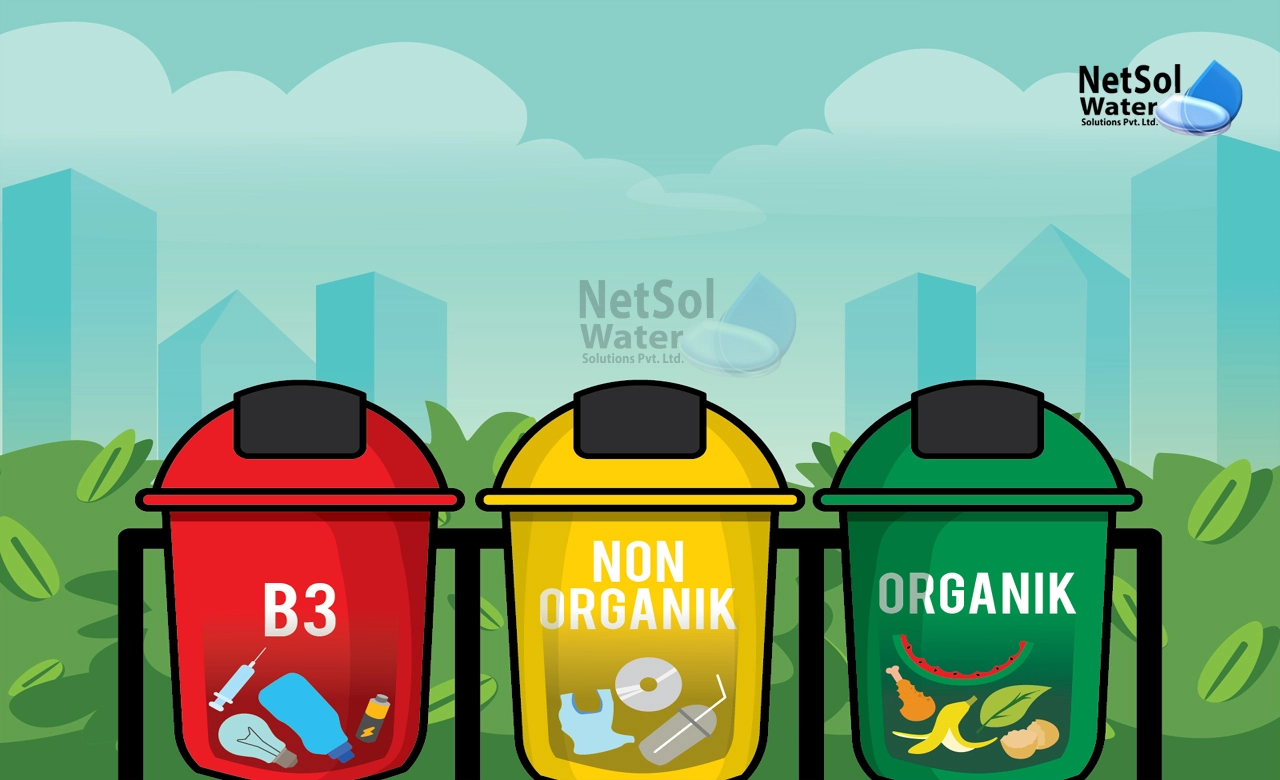
Pathogens:
Bacteria, Viruses, and Parasites: Sewage often contains harmful microorganisms that pose health risks if not properly treated before discharge.
Composition of Sewage Water:
Sewage water is a complex mixture that includes both organic and inorganic substances, as well as various microorganisms. The composition of sewage water can vary depending on the source and the treatment processes it has undergone.
Here are some of the major components found in Sewage Water:
1- Water: The primary component of sewage water is water itself, typically making up the majority of the total volume.
2- Organic Matter: This includes various biodegradable substances such as human waste, food scraps, and other organic materials. These materials contribute to the biochemical oxygen demand (BOD) of the water, which is an important parameter in water quality assessment.
3- Inorganic Matter: Inorganic components in sewage water can include suspended solids, minerals, and various chemicals. Examples include sand, silt, clay, metals, and nutrients like nitrogen and phosphorus.
4- Pathogens: Sewage water may contain various pathogens such as bacteria, viruses, and parasites. These microorganisms pose a significant risk to public health if the water is not properly treated before discharge or reuse.
5- Nutrients: Sewage water often contains nutrients like nitrogen and phosphorus, which are essential for plant growth. However, excessive amounts of these nutrients in water bodies can lead to eutrophication, causing algal blooms and negatively impacting aquatic ecosystems.
6- Chemicals and Pharmaceuticals: Various chemicals and pharmaceuticals may be present in sewage water due to human activities. These can include household and industrial chemicals, as well as residues from medications.
7- Heavy Metals: Industrial discharges can introduce heavy metals, such as lead, mercury, and cadmium, into sewage water. These metals can be toxic to both humans and aquatic organisms.
8- Dissolved Gases: Sewage water can contain gases such as methane, carbon dioxide, and hydrogen sulfide, which are produced during the decomposition of organic matter.
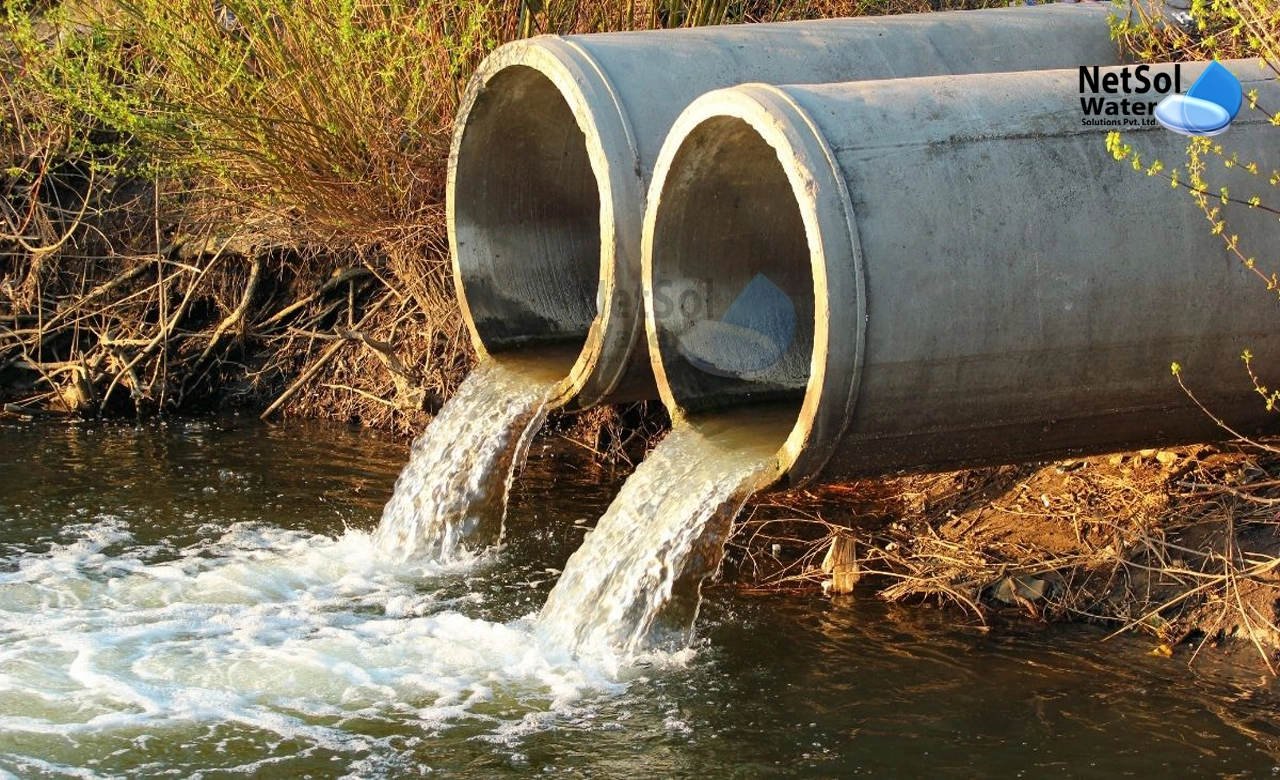
Sources of Sewage Water:
Sewage Water originates from various sources like industrial, and commercial Sources.
Domestic Sewage:
Residential Areas: The wastewater generated from households including toilets, showers, sinks, bathrooms, and laundry is known as Residential Sewage.
Public Facilities: The wastewater is generated from public restrooms, schools, hospitals, and other similar kind of establishments.
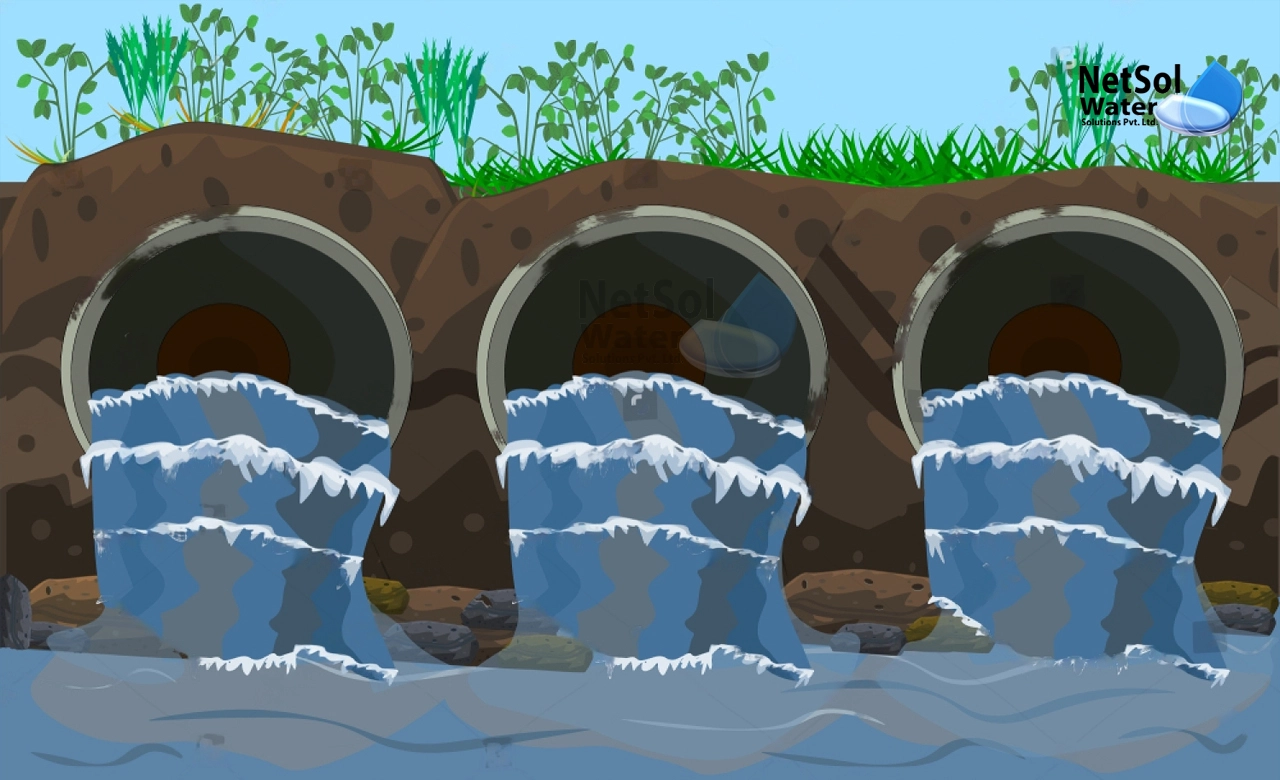
Industrial Sewage:
Manufacturing Plants: Industries release wastewater containing pollutants from various processes, such as chemical manufacturing, food processing, and metal fabrication.
Mining Operations: Discharge of wastewater with minerals and contaminants from mining activities.
Power Plants: Wastewater is produced during the cooling and other industrial processes in power generation facilities.
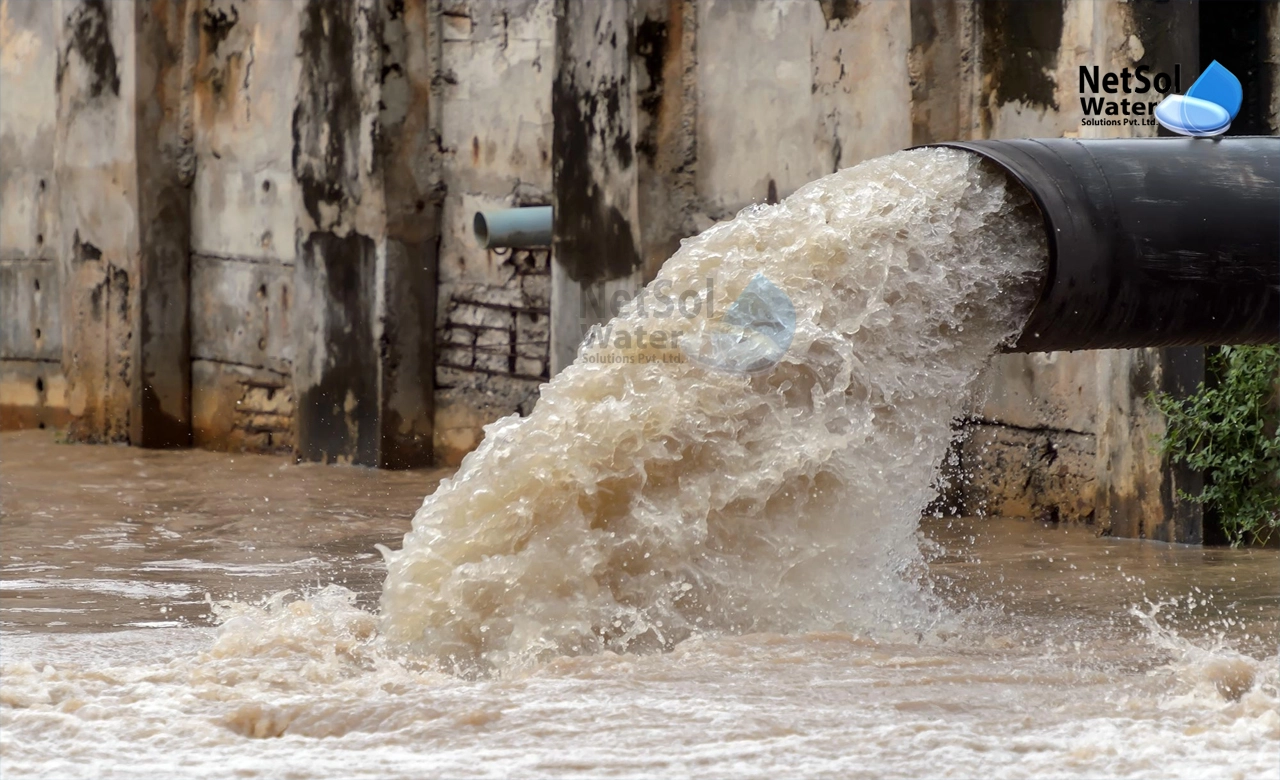
Commercial Sewage:
Commercial Establishments: Wastewater generated by businesses, restaurants, shopping malls, and other commercial establishments.
Hotels: Sewage produced by hotels, motels, and other hospitality facilities.
Stormwater Runoff:
Urban Runoff: Rainwater that flows over streets, parking lots, and other urban surfaces can pick up pollutants and contaminants before entering the sewage system.
Agricultural Runoff: Water from agricultural fields that may contain fertilizers, pesticides, and other chemicals.

Combined Sewer Systems:
In some older urban areas, sewage and stormwater runoff share the same system, known as combined sewer systems. During heavy rainfall, these systems can overflow, leading to the release of untreated sewage into water bodies.
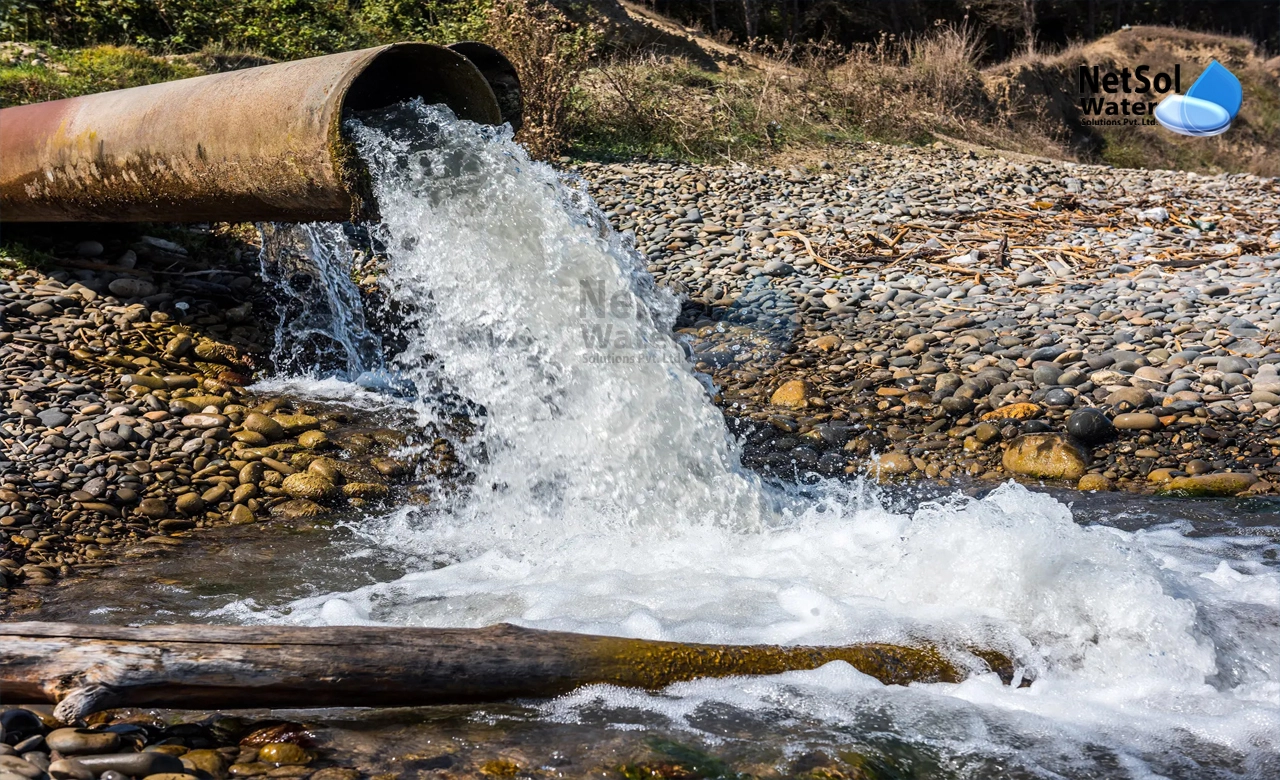
Groundwater Seepage:
Infiltration of groundwater into sewer systems, particularly in areas with aging or damaged infrastructure, can contribute to the volume of sewage water.
Sewage Water Impact on Environment:
Sewage water has a significant impact on the environment. If the sewage water is not managed or treated properly. Below are the Some key points:
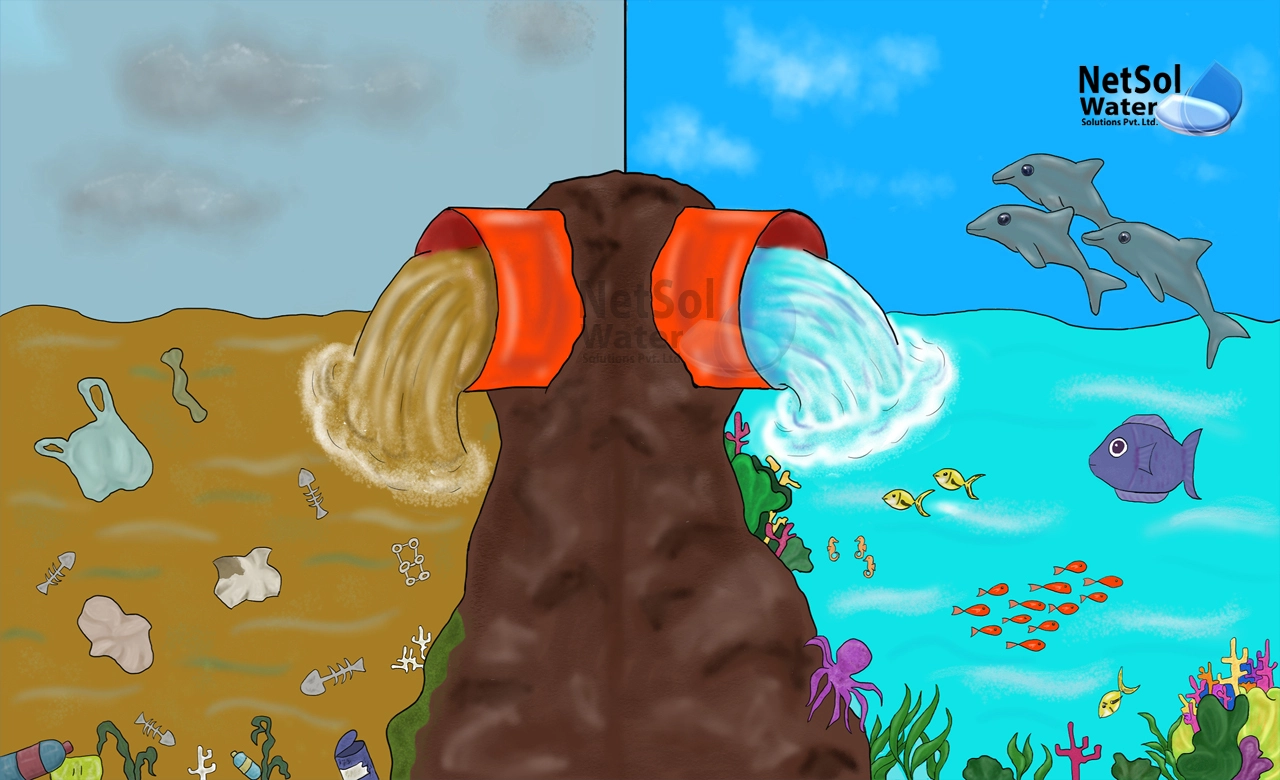
Water Quality Degradation:
Nutrient Enrichment: Sewage water often contains high levels of nutrients such as nitrogen and phosphorus. When discharged into water bodies, these nutrients can lead to eutrophication, causing excessive growth of algae and aquatic plants. This, in turn, depletes oxygen levels in the water, creating "dead zones" where aquatic life cannot survive.
Chemical Contaminants: Sewage water may contain various chemicals and pollutants, including heavy metals, pharmaceuticals, and industrial chemicals. These substances can harm aquatic life, disrupt ecosystems, and accumulate in the food chain.
Disease Transmission:
Pathogens: Untreated sewage water may carry pathogenic microorganisms such as bacteria, viruses, and parasites. The release of these pathogens into water bodies can pose a significant risk to human health and the health of aquatic organisms.
Habitat Destruction:
Sedimentation: The discharge of untreated sewage water can lead to the deposition of suspended solids in water bodies. This sedimentation can smother aquatic habitats, such as the breeding grounds of fish and other organisms, disrupting their life cycles.
Impact on Aquatic Fauna:
Oxygen Depletion: Microbial decomposition of organic matter in sewage consumes oxygen. If the oxygen demand exceeds the natural supply, it can lead to oxygen depletion in water bodies, causing stress or death to fish and other aquatic organisms.
Endocrine Disruption: Chemicals present in sewage water, such as pharmaceuticals and endocrine-disrupting compounds, can adversely affect the reproductive systems of aquatic organisms, leading to population declines and disruptions in the ecosystem.
Soil Contamination:
Agricultural Impact: When untreated sewage water is used for irrigation or when it contaminates soil, it can introduce harmful substances into the agricultural ecosystem. This can affect crop quality and pose risks to human health if contaminated crops are consumed.
Air Pollution:
Emission of Gases: The decomposition of organic matter in sewage can release gases such as methane and hydrogen sulfide, contributing to air pollution and greenhouse gas emissions.
How to Treat Sewage Water in Noida?
The process of Treating sewage water in Noida or any other city plays an important role, this process is about removing contaminants and impurities and making water safe before discharge or use.
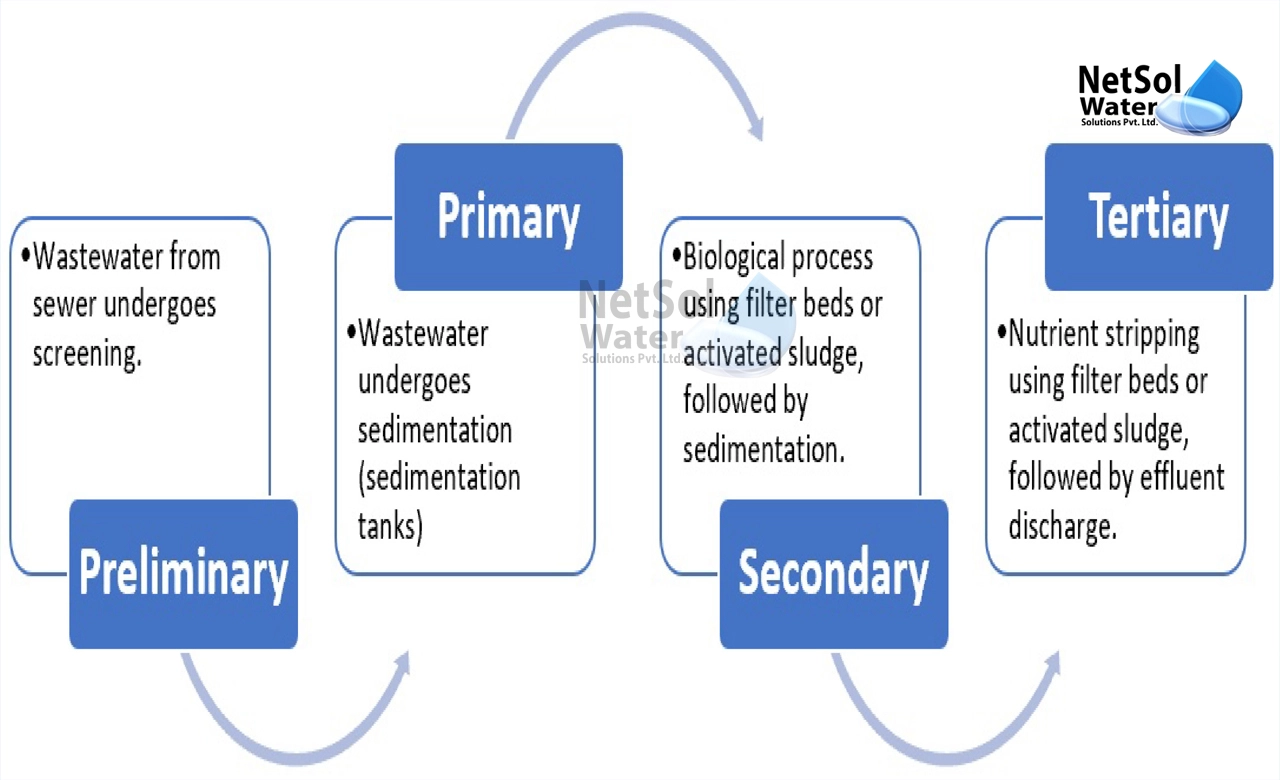
Let's understand How sewage water treatment is done!
Screening and Primary Treatment:
Screening: The sewage water undergoes a screening process to remove large debris and solids such as leaves, plastic, and paper.
Primary Sedimentation: The water is then allowed to sit in large tanks where heavier particles settle to the bottom, forming sludge. This primary treatment helps in removing a significant amount of suspended solids.
Secondary Treatment (Biological Treatment):
Activated Sludge Process or Trickling Filters: In this phase, the water is treated with microorganisms that digest organic matter, breaking it down into simpler, less harmful substances. This can be achieved through processes like the activated sludge process or trickling filters.
Tertiary Treatment:
Filtration: Tertiary treatment involves additional processes to further improve water quality. Filtration may be employed to remove remaining fine particles.
Chemical Treatment: Chemicals such as chlorine or ultraviolet (UV) light may be used to disinfect the water and eliminate any remaining pathogens.
Sludge Treatment:
Anaerobic Digestion or Aerobic Digestion: The sludge separated during the primary treatment undergoes further treatment. Anaerobic or aerobic digestion processes help break down organic matter in the sludge and reduce its volume.
Dewatering: The treated sludge is then dewatered to remove excess water, making it more suitable for disposal or reuse.
Effluent Disposal or Reuse:
Discharge: The treated water, known as effluent, can be discharged into water bodies such as rivers or lakes, following regulatory standards to ensure it does not harm the environment.
Reuse: In some cases, treated sewage water can be reused for non-potable purposes like irrigation, industrial processes, or replenishing groundwater.
Monitoring and Compliance:
Regular monitoring of effluent quality is crucial to ensure that the treated water meets environmental standards and regulatory requirements.
Public Awareness and Education:
Educating the public about the importance of proper waste disposal, water conservation, and the impact of sewage on the environment is essential for long-term sustainability.
How to choose sewage treatment plant manufacturers in Noida?
In Noida, there are many sewage treatment plant manufacturers, and choosing the right one is a very typical task. This article aims to provide a piece of detailed information about choosing the best sewage treatment plant manufacturers in Noida.
Define Your Requirements:
Determine the specific requirements of your sewage treatment plant, including the capacity, treatment process, and any specific features needed for your application.
Research and Shortlist Manufacturers: Start by researching and identifying sewage treatment plant manufacturers in Noida look for the companies that have good records and positive reviews from previous clients.
Such kind of research can be done through online platforms, and business directories along with this you can ask for a recommendations from colleagues and business professionals in this field.
Check Credential & Certifications:
Verify the credentials and certifications of Sewage treatment plant manufacturers in Noida. Make sure that they comply with the industry norms and regulations as per CPCB.
Go through for certifications required such as ISO certification, approval from environmental agencies, and compliance with local wastewater treatment regulations
Expertise & Experience:
Consider only those companies who have broad experience in designing and manufacturing of sewage treatment plants. Manufacturers that have decades of experience can provide effective efficient and reliable solutions.
Find out the manufacturers that have experience in handling multiple projects like yours in terms of complexity and scale.
Technology and Innovations: Assess the technology and innovation incorporated into the sewage treatment plants offered by each manufacturer. Look for advanced and efficient treatment processes that can meet or exceed regulatory standards.
Consider manufacturers who stay updated with the latest advancements in sewage treatment technology.
Quality of Equipment and Materials:
Inspect the quality of materials and equipment used in the manufacturing of sewage treatment plants. High-quality components contribute to the longevity and reliability of the system.
Ensure that the manufacturer sources materials from reputable suppliers and follows strict quality control measures.
Customization and Scalability:
Check if the manufacturer can provide customized solutions tailored to the specific requirements of your project.
Consider the scalability of the sewage treatment plant to accommodate potential future increases in wastewater volume.
After-Sales Support and Maintenance:
Inquire about the after-sales support and maintenance services offered by the manufacturer. A reliable support system is essential for addressing any issues that may arise after installation.
Check if the manufacturer provides training for the operation and maintenance of the sewage treatment plant
Cost Consideration:
Compare the costs provided by different manufacturers, taking into account the overall value, including quality, technology, and support services.
Be cautious of extremely low-cost options that may compromise on quality and performance.
References and Case Studies:
Ask for references and case studies from the manufacturer. Contact previous clients to gather feedback on their experiences with the manufacturer and the performance of the sewage treatment plant.
Conclusion:
In essence, making an informed decision about sewage treatment plant manufacturers in Noida requires thorough research, meticulous consideration of the factors mentioned above, and a commitment to choosing the solution that best aligns with your specific needs. By investing time and effort into this decision-making process, you pave the way for a reliable, efficient, and sustainable sewage treatment solution.


